South African Heroes of Change: Thabo Mbeki, Winnie Madikizela-Mandela, and Nkosi Johnson
Thabo Mbeki, born Thabo Mvuyelwa Mbeki on June 18, 1942, is a South African politician who played a crucial role in the country’s transition from apartheid to democracy. Here is an overview of his life and career:
Early Life and Education:
- Thabo Mbeki was born in Mbewuleni, a village near Idutywa in the Eastern Cape province of South Africa.
- He is the son of Govan Mbeki, an anti-apartheid activist and a leader of the African National Congress (ANC).
- Thabo Mbeki’s early activism against apartheid led to his involvement in the ANC Youth League during his university years.
- He studied at the University of London’s School of Oriental and African Studies, where he earned a Master’s degree in economics.
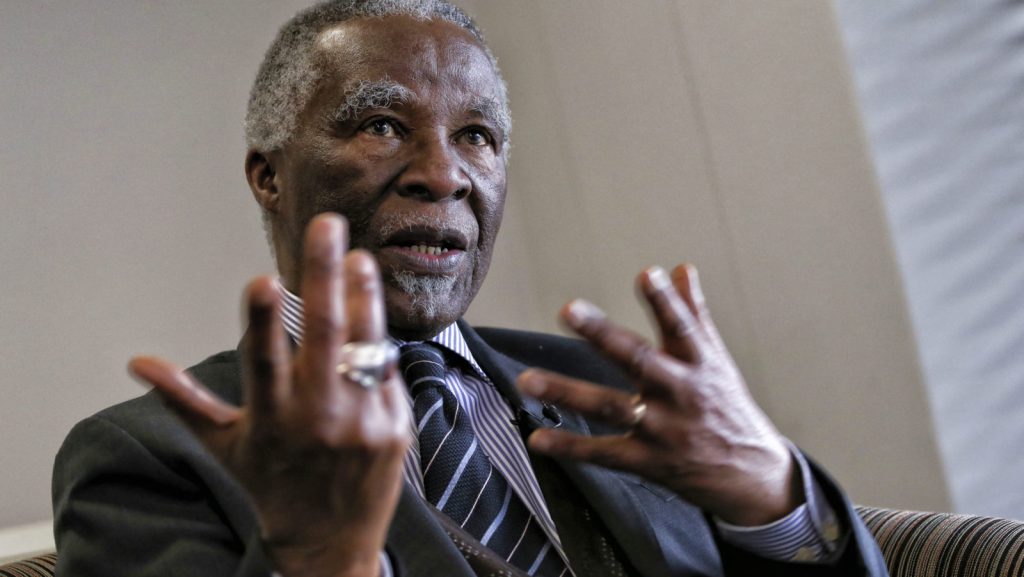
Political Activism:
- Thabo Mbeki joined the ANC in 1956 and became involved in anti-apartheid activities.
- He went into exile in the early 1960s and received military training in the Soviet Union.
- Mbeki was actively engaged in the ANC’s struggle against apartheid from abroad.
Role in Negotiations and Transition:
- Thabo Mbeki played a crucial role in the negotiations to end apartheid, leading to the country’s first democratic elections in 1994.
- He was a key figure in the constitutional negotiations that facilitated the transition to majority rule.
- After the ANC’s victory in the 1994 elections, Nelson Mandela appointed Mbeki as Deputy President of South Africa.
Presidency (1999-2008):
- Thabo Mbeki succeeded Nelson Mandela as President of South Africa in 1999.
- His presidency was marked by economic growth, but he faced criticism for his handling of the HIV/AIDS epidemic.
- Mbeki pursued the African Renaissance as a key foreign policy objective, focusing on development and conflict resolution in Africa.
Controversial Stance on HIV/AIDS:
- Thabo Mbeki’s government faced international criticism for its skepticism toward the link between HIV and AIDS.
- The controversial stance delayed the implementation of antiretroviral treatment programs, contributing to a high rate of HIV/AIDS-related deaths.
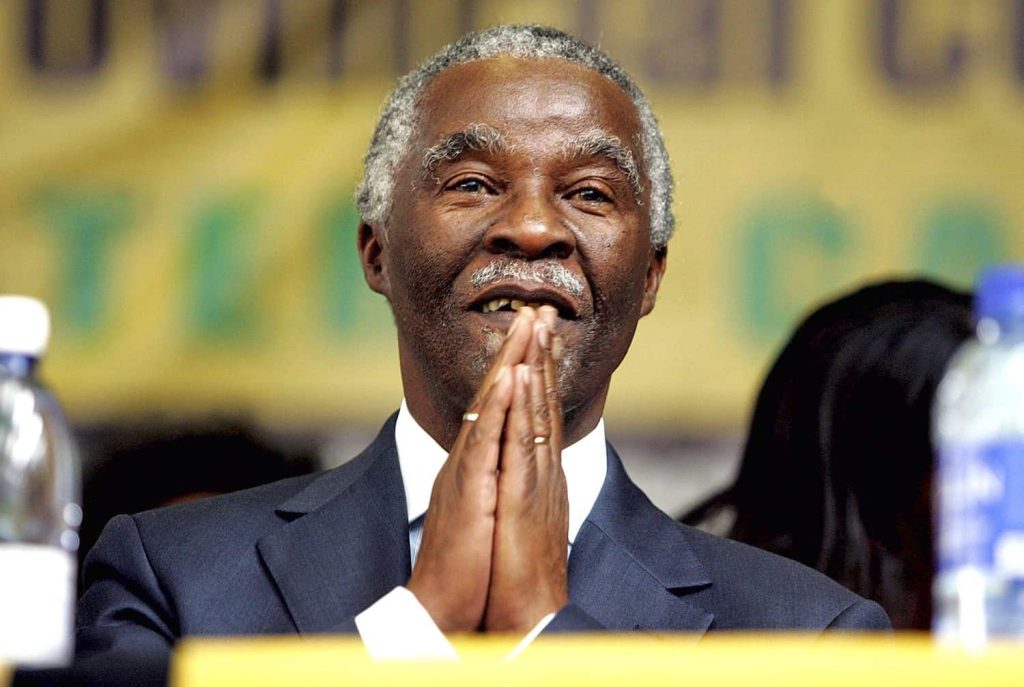
Resignation:
- In 2008, Thabo Mbeki resigned as President of South Africa following internal political pressure from within the ANC.
- His resignation came amid tensions within the party, particularly regarding his leadership style and disagreements with other ANC leaders.
Post-Presidential Activities:
- After leaving the presidency, Mbeki continued to be involved in African politics and conflict resolution efforts.
- He has served as a mediator in various African conflicts and has been involved in initiatives to address development challenges on the continent.
Thabo Mbeki’s political career is characterized by his involvement in the struggle against apartheid, his contributions to the negotiation process that led to democratic elections, and his presidency marked by economic growth and controversies.
Winnie Madikizela-Mandela – South African anti-apartheid activist and politician.
Winnie Madikizela-Mandela (1936–2018) was a prominent South African anti-apartheid activist and politician. Here’s an overview of her life and contributions:
Early Life:
- Born Nomzamo Winifred Zanyiwe Madikizela on September 26, 1936, in Bizana, Pondoland (now part of Eastern Cape), South Africa.
- Madikizela-Mandela’s Xhosa name was Nomzamo. She was born in the village of Mbhongweni, Bizana, Pondoland, in what is now the Eastern Cape province. She was the fifth of nine children, seven sisters and a brother. Her parents, Columbus and Gertrude, who had a white father and Xhosa mother, were both teachers. Columbus was a history teacher and a headmaster, and Gertrude was a domestic science teacher. Gertrude died when Winnie was nine years old, resulting in the break-up of her family when the siblings were sent to live with different relatives. Madikizela-Mandela went on to become the head girl at her high school in Bizana.
- Upon leaving school, she went to Johannesburg to study social work at the Jan Hofmeyr School of Social Work. She earned a degree in social work in 1956, and decades later earned a bachelor’s degree in international relations from the University of the Witwatersrand.
- She held a number of jobs in various parts of what was then the Bantustan of Transkei; including with the Transkei government, living at various points of time at Bizana, Shawbury and Johannesburg. Her first job was as a social worker at Baragwanath Hospital in Soweto
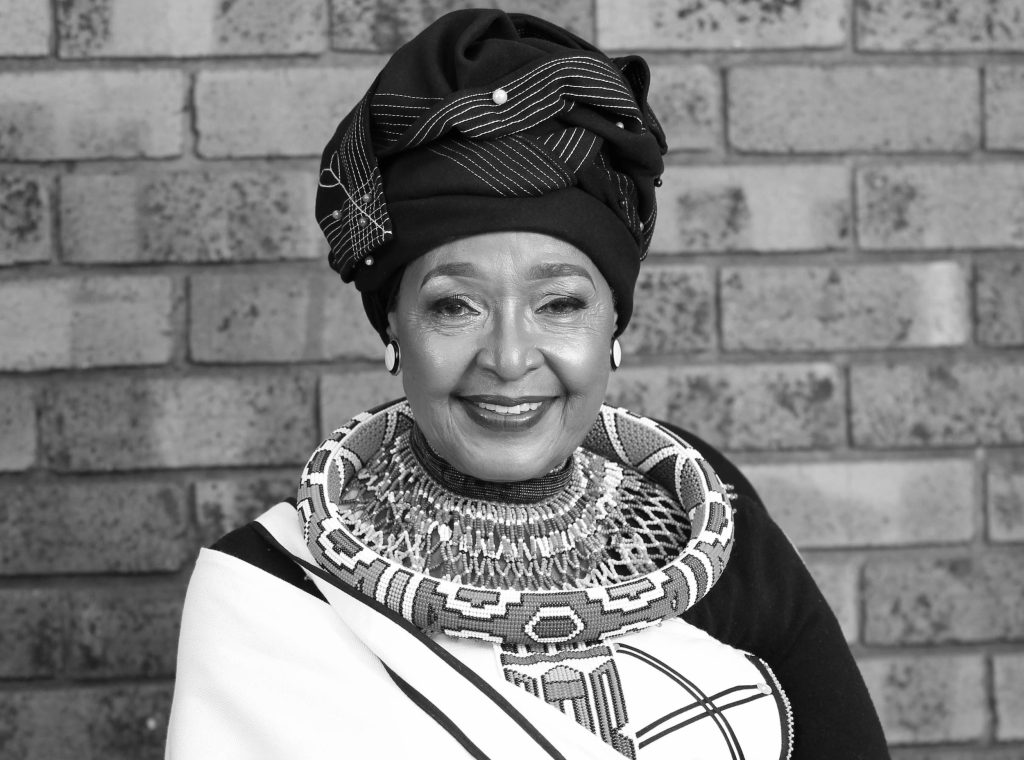
Marriage to Nelson Mandela:
- Winnie met Nelson Mandela in the 1950s, and they married in 1958.
- Her husband, Nelson Mandela, became a leading figure in the anti-apartheid movement, and Winnie became actively involved in political activism alongside him.
Anti-Apartheid Activism:
- Winnie Madikizela-Mandela played a significant role in the struggle against apartheid, especially during her husband’s imprisonment.
- She faced persecution, including arrests and solitary confinement, for her activism against the oppressive apartheid regime.
Challenges and Controversies:
- Winnie’s involvement in controversial activities, including the endorsement of “necklacing” (a form of execution), led to criticism and strained relations within the anti-apartheid movement.
- She was convicted of kidnapping and assault in 1991, although her six-year sentence was later reduced to a fine on appeal.
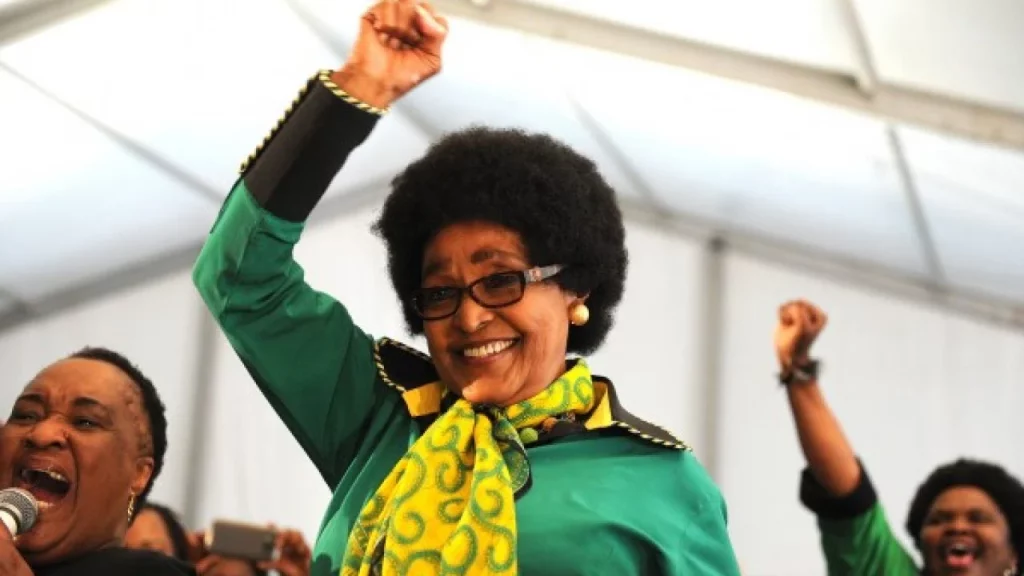
Post-Apartheid Era:
- After Nelson Mandela’s release from prison in 1990 and the end of apartheid, Winnie continued her political career.
- She served as a Member of Parliament and held various positions within the African National Congress (ANC).
Divorce and Later Years:
- Winnie and Nelson Mandela divorced in 1996, after 38 years of marriage.
- In her later years, she faced legal and financial challenges and was involved in controversies within the ANC.
Legacy:
- Despite controversies, Winnie Madikizela-Mandela is celebrated for her courageous activism against apartheid.
- She is remembered as a symbol of resistance and a powerful voice for justice and equality.
- Winnie Madikizela-Mandela passed away on April 2, 2018, at the age of 81.
Winnie Madikizela-Mandela’s life reflects the complexities and challenges faced by those fighting against apartheid in South Africa. Her legacy is a mix of admiration for her resistance against injustice and criticism for certain actions during a tumultuous period in the country’s history
NKOSI JOHNSON – A South African Child Activist the poster child for the rights of children with HIV/AIDS
Nkosi Johnson was a South African child activist and the poster child for the rights of children with HIV/AIDS. Here is an overview of his life and contributions:
Early Life:
- Nkosi Johnson was born on February 4, 1989, in a township near Johannesburg, South Africa.
- He was born HIV-positive, and his mother, who was also HIV-positive, passed away when he was an infant.
- Nkosi was born to Nonthlanthla Daphne Nkosi in a village near Dannhauser in 1989. He never knew his father. Nkosi was HIV-positive from birth, and was legally adopted by Gail Johnson, a Johannesburg Public Relations practitioner, when his own mother, debilitated by the disease, was no longer able to care for him.
- The young Nkosi Johnson first came to public attention in 1997, when a primary school in the Johannesburg suburb of Melville refused to accept him as a pupil because of his HIV-positive status. The incident caused a furore at the highest political level – South Africa’s Constitution forbids discrimination on the grounds of medical status – and the school later reversed its decision.
Adoption and Activism:
- Gail Johnson, a Johannesburg public relations specialist, adopted Nkosi when he was a few months old.
- Nkosi faced discrimination and stigma due to his HIV-positive status, including being denied entry to school.
- In 1997, Nkosi’s foster mother took legal action against the school, leading to a landmark case that challenged HIV/AIDS discrimination.
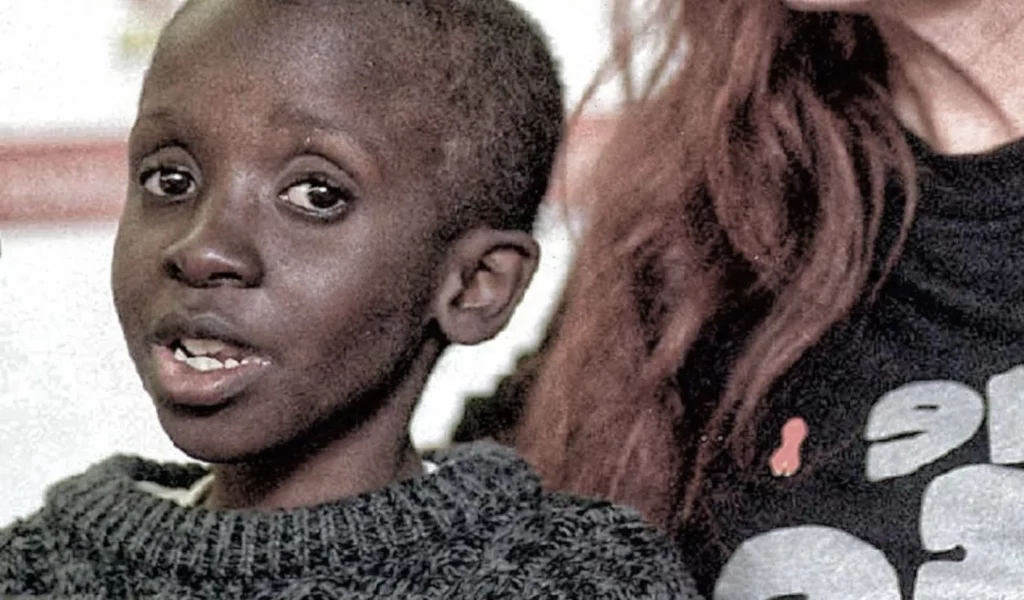
Impactful Speech:
- In July 2000, at the age of 11, Nkosi addressed the 13th International AIDS Conference in Durban, South Africa.
- His speech emphasized the plight of children living with HIV/AIDS and called for an end to discrimination and stigma.
- Nkosi’s speech drew international attention and increased awareness about the impact of the HIV/AIDS epidemic.
Legacy:
- Nkosi Johnson became an iconic figure in the global fight against HIV/AIDS.
- He received several awards for his activism, including the International Children’s Peace Prize.
- Nkosi passed away on June 1, 2001, at the age of 12, due to AIDS-related complications.
- Nelson Mandela referred to Nkosi as an “icon of the struggle for life.”
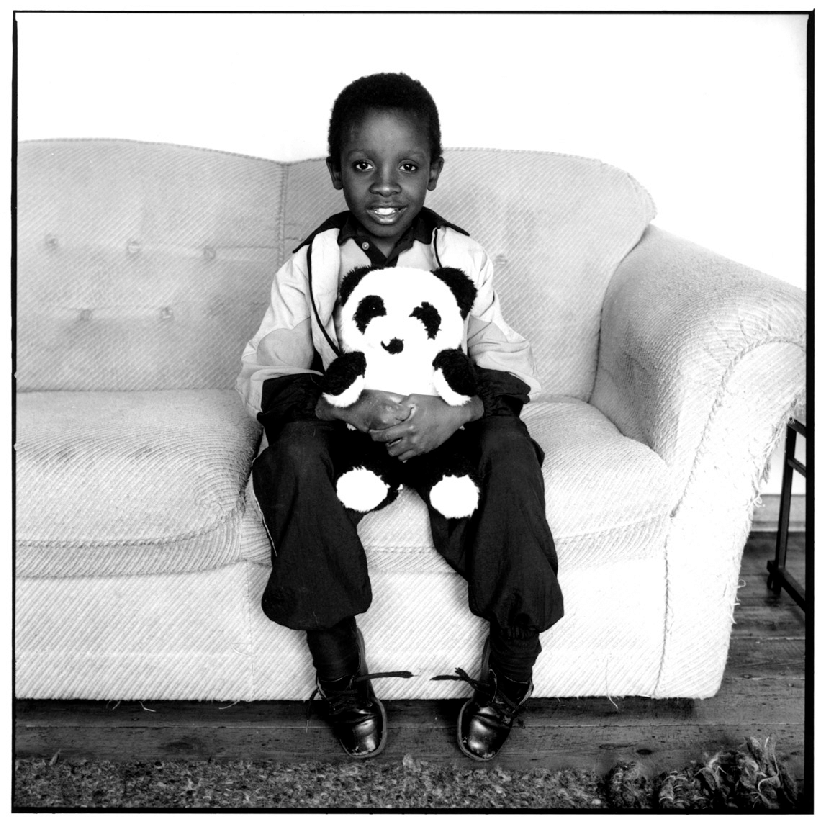
Nkosi’s Haven:
- After Nkosi’s passing, Gail Johnson established Nkosi’s Haven, a nonprofit organization that provides care and support to families affected by HIV/AIDS.
- Nkosi’s Haven operates as a residential facility and assists with medical, educational, and social support.
Nkosi Johnson’s life and advocacy significantly contributed to changing perceptions about HIV/AIDS and advocating for the rights and dignity of those affected by the epidemic, especially children. His legacy continues through the work of Nkosi’s Haven and ongoing efforts to address the global impact of HIV/AIDS.
Add a Comment
You must be logged in to post a comment.

